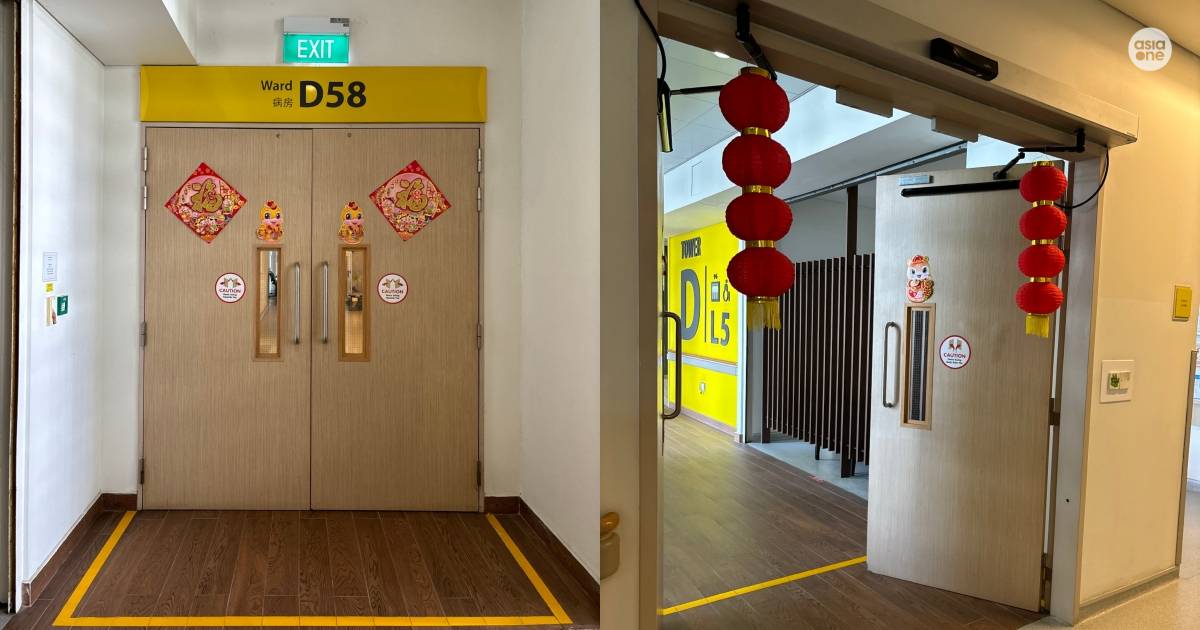As Chinese New Year draws near, many are immersed in festive preparations — sprucing up their homes, shopping for new clothes and settling the menu for reunion feasts.
But for some, the celebrations take on a different tone.
Rather than marking the occasion with the lively chatter of family and the aroma of bak kwa or hot pot, Sharon Yap will be spending her Lunar New Year in an unconventional location — a hospital.
She was warded at Yishun Community Hospital three months ago and, given the trajectory of her recovery process, it is unlikely that the 54-year-old will be discharged in time to celebrate Chinese New Year this year as she normally would every other year.
How it began
What started out as a fever one night last year soon escalated into a healthcare ordeal for Sharon.
Not thinking that it was anything serious initially, she visited a polyclinic the next morning — where a doctor urged her to call an ambulance and she was admitted to a hospital.
She initially thought that she had been admitted for a “mild fever” and that she would be discharged after a couple of days of hospitalisation and IV drips.
But Sharon eventually found out that she had gallbladder disease and required surgical treatment.
“This condition… why did it find me? [Prior to this] my life was full of fun and excitement. I did not expect this to happen,” she expressed.
Missing her furry best friend
Before this year, Chinese New Year celebrations weren’t too far from the norm for Sharon.
The divorcee, who currently lives away from her children, would join her older brother’s family for the usual festivities — indulging in her favourite festive treats, playing cards late into the night and catching up with loved ones over a drink or two.
This was something that she had done “every year from young until old”.
Despite this annual tradition, there is a relative sense of indifference to spending the festive season with the family for Sharon, who works as a drinks-stall assistant.
Her parents’ health issues meant she had minimal opportunities since she was young to form a strong connection with them.
“I don’t really have that [feeling of]… how do I put it? Familial bond?
“I wasn’t together or interacted with them much,” she shared with AsiaOne.
While not being able to partake in her usual Chinese New Year festivities wasn’t the most upsetting part about her hospitalisation, it’s having to spend time away from her beloved dog — fondly named Baobei (precious or beloved in Mandarin) — that has dampened her spirits.
Sharon has just Baobei for company back at home in her two-room flat, having brought it home nine years ago when it was only three months old.
“I don’t really miss any of these [Chinese New Year activities]. I only miss my dog. I’m okay with not having anything… [but] my dog keeps me company. Just the dog is enough,” she said.
“We depend on each other.”
In fact, the two had been so inseparable that Sharon even stated that she “wouldn’t go anywhere that her dog couldn’t”.
It has been a few months since Sharon last saw Baobei, with her friend helping to take care of it in the meantime. This Chinese New Year, some of the staff at Yishun Community Hospital had been planning a visit from her furry friend.
Assistant nurse clinician Penny Chen, senior physiotherapist Halim Zul Fahmi and medical social worker Kathryn Tan — who have formed a close relationship with Sharon — told AsiaOne that the hospital’s holistic approach to patient recovery allows for such visits to happen.
Kathryn noted that this can act as a form of motivation for the patient.
In this case, they can gently coax Sharon to follow through with her medical procedures so that she can potentially go home “a little earlier” to reunite with her beloved pet.
The hope is that setting achievable goals and objectives will help empower patients.
Unfortunately, AsiaOne understands that Sharon’s health has worsened and the dog visit has been delayed until further notice.

According to Penny, the hospital sees a rise in the number of family visits during festive periods like Chinese New Year.
She added: “Usually we will also allow patients to go down to level one [of the hospital], where there are benches for them to sit with their families.”
Her colleague Halim pointed out that the hospital also considers home leave — where patients deemed medically fit can return home for a certain time before coming back to the hospital — as an alternative.
If a patient is likely to stay in hospital over the festive period, the staff will ask them and their families in advance if they would like to take home leave, he added.
When AsiaOne visited Yishun Community Hospital a few weeks before Chinese New Year, the wards were already adorned with festive decorations.
Some of the doors had decorations bearing the word fu (fortune in Mandarin) and lanterns, with pots of plum blossoms placed around the wards to mark the occasion.
Additionally, the hospital will be serving a special Chinese New Year meal to patients on the eve of the holiday.
The menu will include healthy renditions of festive classics like Prosperity Braised Cabbage, Yellow Marrow with South and North Almond Soup and Orange Mousse.
Sharon has come to terms with the fact that she’s likely to spend the festive season in hospital, with the staff for company and occasional visits from her children.
If all goes well health-wise, she hopes to celebrate her next Lunar New Year beyond Singapore’s shores.
“Looking forward, I want to travel overseas. My children said that when I recover and get better, they’ll take me travelling,” she said.
When asked if she had any travel destination in mind, she replied: “I’ll go wherever they take me.”
[[nid:670800]]
amierul@asiaone.com
carol.ong@asiaone.com
Read the full article here


